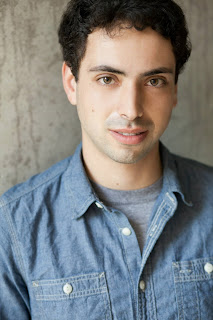Rodrigo Castro’s work is a counterpoint of ideas laid out in mosaic, fractal, and dendrite forms. Imbued with an esoteric spirit, the organic cell-driven structures that he creates in every piece project atmospheres where spectral and playful echoes are chanted in a shifting sense of time. Rodrigo’s music aims to perfume the environment with aleatoric waves that highlight the liminal spaces between individual and universal identities. His esoteric music evokes feelings or memories in each listener with spiritual and metaphorical considerations and with the aim to create musical landscapes that need to exist. As a troubadour of his own time, he uses the orchestra to redefine the vernacular melodies and rhythms of his Mexican and Cuban heritage. Rodrigo’s work is influenced by artists such as Silvio Rodríguez, Bob Dylan, Luis Eduardo Aute and Leonard Cohen.
Rodrigo’s piece La gaviota was selected for the 2019 Underwood New Music Readings where it will be workshopped and read by American Composers Orchestra and conductor Ludovic Morlot. Rodrigo spoke to us about the readings and his piece.
Rehearsals, workshops, and final readings are open to the public on May 23 and 24 at NYU's Frederick Loewe Theatre (35 W 4th St). RSVP here
 |
| Composer Rodrigo Castro |
American Composers Orchestra: What was your reaction to finding out your piece had been selected for the Underwood New Music Readings?
Rodrigo Castro: Considering the somewhat challenging circumstances behind my piece’s inception, and its varying stages of development, I was astounded and relieved upon finding out that I was one of the selected composers. In the following days, I began to feel more of a sense of contentment and pride in my work and efforts. By now, I feel excited from the anticipation and, most of all, incredibly thankful for this important opportunity.
ACO: What are you doing to prepare for the readings? Are there any changes you have made to your piece?
RC: In preparation for the readings, I had to reconsider some aspects of my piece with a critical sense for both refinement and pragmatism. It was encouraging to know that I still had the chance to chisel away at some specific details that could ensure a more productive experience. With that in mind, I reworked some minor aspects of the orchestration in certain passages, as well as the approach to some extended techniques and even some editing of the overall layout of the piece. It was a refreshing review of my ideas after having some time to gather a more objective perspective on the aesthetic intentions proposed in the work. With a better sense for how to balance out some areas, that may not have been entirely convincing, or even properly formed at first, the piece is now imbued with a new sense for the occasion.
ACO: What are you looking forward to about the workshops and readings? What do you hope to learn from the experience?
RC: I am very much looking forward to meeting all of the wonderful people behind this project. Naturally, the emphasis is on the experience of hearing my piece and learning all that there is still to learn about my work, but the feeling of belonging to such an important moment shared by all who are involved, is undoubtedly something to look forward to as well. As it is, composers of new music do not often have a such a significant chance to learn more about their creative ideas through a tangible experience, and everything has been set up for us to really dive deep into the atmosphere of our field. This is where the abstractness of what we do will become a reality that we can engage with. Our art form is mostly driven by context, and these readings are an important next step for our development in light of that pursuit.
I hope to learn about specific concerns, such as finding an equilibrium between one’s distinctive artistic vision and the practical considerations implied when working with an ensemble and within the protocols of our trade. I also hope that I will learn more, and in a comprehensive manner, about what it really means to be a composer in our world and of our times, through what promises to be a very meaningful experience.
Hear Rodrigo's piece at the 2019 Underwood New Music Readings. Rehearsals, workshops, and final readings are open to the public on May 23 and 24 at NYU's Frederick Loewe Theatre (35 W 4th St). RSVP here





